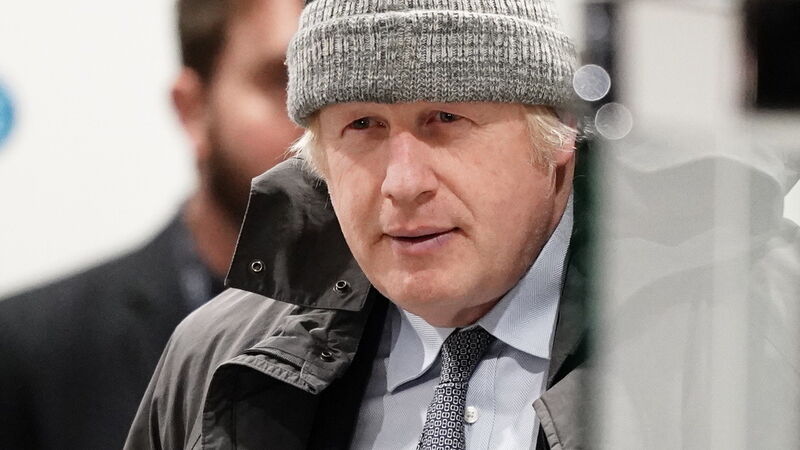Irish Examiner view: Lessons to be learned for Ireland

Former UK prime minister Boris Johnson leaving the covid-19 inquiry after giving evidence. Serious questions about the performance of his administration are emerging from this inquiry, and several political reputations are likely to be bruised. Picture: Jordan Pettitt/PA
Former UK prime minister Boris Johnson appeared at the official British public inquiry into the covid-19 pandemic yesterday, where he was questioned on his decisions and behaviour during that time.
The pandemic already overshadows Mr Johnson’s career.
He was forced to resign in disgrace as prime minister in September last year, with reports that he and other high-ranking officials had been present at parties which broke lockdown rules — highlighting just one of the scandals that brought him down.
The inquiry has already heard damning evidence from previous witnesses about Mr Johnson’s performance in dealing with the pandemic, so interest in his appearance was high before he even began his testimony. When he did so yesterday, he offered an apology which was promptly interrupted by four protesters who held up placards stating that the dead could not hear apologies.
After those protesters were removed from the hearings, the inquiry resumed, and soon enough the matter of 5,000 WhatsApp messages that are missing from Mr Johnson’s phone was mentioned. The former politician said he had no memory of attempts to reinstate those messages: Business as usual.
Mr Johnson’s image as a shambolic buffoon now appears to be coming back to haunt him with a vengeance — it is notable to see the reliance on his surname now in coverage of the inquiry, as opposed to the matey “Boris” which many outlets favoured when he was on the up.
Serious questions about the performance of his administration are emerging from this inquiry, and several political reputations are likely to be severely bruised in the process.
The temptation is to tut-tut at the details of the chaos being spelt out in minute detail, but the inquiry template being used in Britain is one which could be usefully learned for here.
The inquiry has the scope to range over matters as specific as Britain’s test-and-trace operations, to far broader topics such as general health inequalities, from the impact of covid on healthcare systems to the general questions of government procurement and PPE.
This kind of broad-ranging inquiry is also needed in Ireland. While our leaders never opted for strategies like the catastrophic herd immunity approach over the water, an inquiry will ensure we remember what we did right — as well as wrong.
Spotify facing the music
Spotify, the music streaming service, is to lay off 1,500 employees to reduce costs, its CEO announced earlier this week. This is the latest round of job cuts at Spotify this year. The company, which employs more than 9,000 people in total, laid off more than 500 employees in January. In the period from June to September, Spotify made a profit of just €32m, compared to a loss of €228m during that period last year. The company has an estimated 226m subscribers.
The loss of thousands of jobs is terrible in any sector, but there is another industry which has suffered a collapse as a direct result of Spotify’s activities: The music industry.
Even those paying for Spotify’s premium service are paying a monthly fee which is less than the price of an album. This is only possible because Spotify pays artists infinitesimally small amounts per stream, fractions of a cent at a time, far less than the amount artists could expect from record or CD sales in the old era of physical media.
For many, the sheer convenience of having access to the Spotify library is simply irresistible. This is easy to understand, particularly for those old enough to remember a time when finding an obscure song or artist was far more challenging than simply tapping a name into the search function on a phone.
However, Spotify has also destroyed what was a functioning economy for musicians by helping to kill the royalty-per-sale model for the sake of that convenience. It has seriously damaged the notion of value in artistic creation and also made it more difficult for those seeking to begin a career in music, though the company was eager to pay professional boor Joe Rogan millions to keep his podcast on its platform.
There can be no gloating over job losses anywhere, but many will surely see the irony in Spotify feeling the crunch as its revenue stream falters.
Age is no barrier
The passing of Rosemary Smith at the age of 86 drew warm tributes, not least from President Michael D Higgins.
“In an extraordinary motorsport career,” the President said,“she defied all expectations of her time in becoming a renowned force in a sport then, as now, so heavily dominated by men.”
Smith’s achievements are all the more remarkable given the period in which they occurred. She remains the only woman to have won the Tulip Rally in Holland, in 1965.
The fact that she did so at a time when attitudes to women in general, never mind women in motorsport, were far less evolved — to put it mildly — makes the accomplishment all the more admirable.
Age was no barrier to Smith. At 77, she drove from London to Monte Carlo — an eight-day trip over the Alps; two years later she became the oldest person to drive a current-specification Formula 1 car. She told Margaret Jennings of this newspaper that circumstances had left her “stony broke” in her 50s, but she rallied and established a driving school for transition years and got back on her feet financially.
A trailblazer all her life, her funeral plans included a pink wickerwork casket. An icon to the last.
CONNECT WITH US TODAY
Be the first to know the latest news and updates





